Courses
-
English 325: Contemporary Literature and Digital Media (spring 2020)
How have literary expression and our understandings of the self changed alongside the media technologies of the twenty-first century? This course examines the place of fiction among social media, big data, fan fiction, video games, and the many other forms of entertainment that compete with it today. To do so, we’ll learn about the history of media forms, and some of the methods of media studies, which consider how media forms shape the stories they convey. More >>>
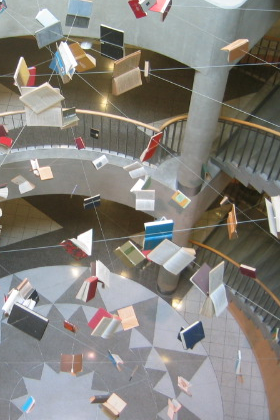 Ignacio Rabado, Babel Library IX, photo by Susan Groppi
Ignacio Rabado, Babel Library IX, photo by Susan Groppi
-
English 566: 20th-Century American Prose (spring 2020)
This course will introduce students to major texts and current critical methods in 20th-century U.S. literary studies, with a focus on the novel and prose nonfiction. We’ll cover texts and authors on the MA reading list while surveying recent scholarship that will provide good models for doctoral-level research questions and methods. We’ll place some emphasis on the relationships between new media technologies and literature across the century, but the course will also provide a firm foundation in major movements, periods, and topics in the field. More >>>
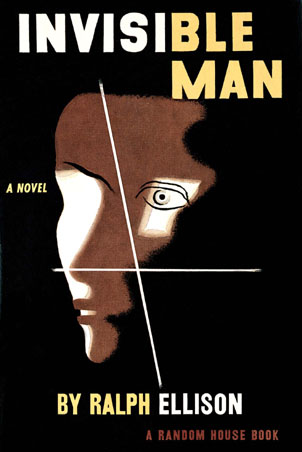 Ralph Ellison's Invisible Man, first edition, 1952
Ralph Ellison's Invisible Man, first edition, 1952
-
English 496A: American Upheavals: The 50s, 60s, and 70s (fall 2019)
This senior seminar takes the decade—our usual way of dividing, or periodizing, shifts in mood, culture—as a starting point for digging deeper into the relationships between literature, history, and politics in one of the most turbulent periods in U.S. cultural history. As we investigate how ideas from this period inform how we think about the politics of culture and about ourselves, we’ll be asking thorny questions about the terms, assumptions, and methods of literary study: periodization, historical emplotment and national allegory, sociologies of the literary field, and more. More >>>
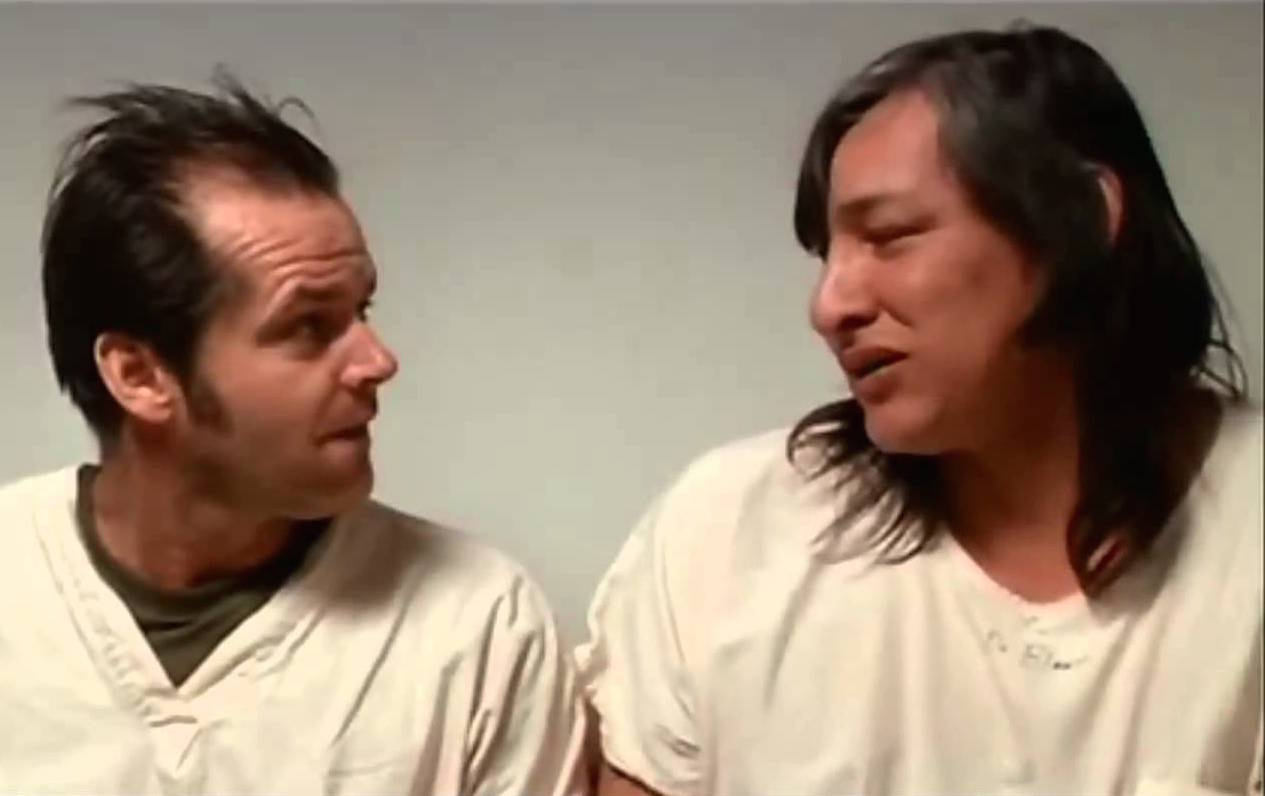 Jack Nicholson and Will Sampson in One Flew Over the Cuckoo's Nest, 1975
Jack Nicholson and Will Sampson in One Flew Over the Cuckoo's Nest, 1975
-
English 380: Intro to Literary Studies: Encounter (fall 2019)
This course is an intensive introduction to the knowledge and skills required for reading closely and writing convincingly about literary texts. We will primarily be reading short but challenging works from a variety of time periods and contexts. Loosely linking these works will be the theme of “encounter,” and we’ll look how literary writers have variously staged ethically and erotically charged meetings with the exotic, the foreign, and the unknown. We’ll read selectively in early modern, romantic, and modern poetry, and selections of fiction and drama will likely include work by William Shakespeare, Aphra Behn, Herman Melville, Joseph Conrad, Ernest Hemingway, Nella Larsen, J. More >>>
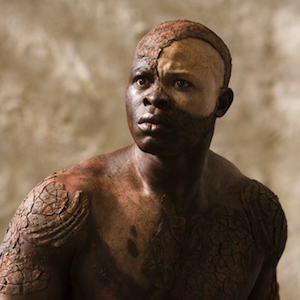 Djimon Hounsou as Caliban, 2010
Djimon Hounsou as Caliban, 2010
-
English 311: The Science Fiction Short Story (spring 2019)
What can we learn for our own future from a century’s worth of aliens, robots, and star wars? How does science fiction help us to think about the differences between others and ourselves? This course looks at science fiction through a history including the early pulp magazines, the golden age, the new wave, cyberpunk, and contemporary U.S. and global works. We’ll explore science fiction’s big questions and aesthetic techniques, mostly through stories but also in film, digital media, fan universes, and at least one novel. More >>>
Galaxy Magazine, October 1957, detail
-
English 484B: Twentieth-Century American Novel (fall 2018)
In this course, we’ll consider the career of the novel in the U.S. over the course of the past eleven decades. This era saw a staggering number of changes in the U.S.: the country’s shifting geopolitical roles, new media and communications technologies, cultural revolutions and radical movements, and institutional transformations in the production and study of literature. We’ll approach the ambitions of novelists in this period of the “great American novel” in two ways. More >>>
 Ralph Ellison's Invisible Man, first edition, 1952
Ralph Ellison's Invisible Man, first edition, 1952
-
English 596K: Literature and Science and Technology Studies (fall 2018)
This course is an introduction to the interdisciplinary field of Science, Technology, and Society (STS), with a strong focus on the questions literature raises for the field. Chief among these will be reflecting on how we map the complex historical relationships between scientific discourses and artistic production. We’ll start in the nineteenth century but spend most of our time in a set of 20th century US and UK historical contexts that will include histories of race, epidemiology, sexology, climate science, the cultural roles of expertise, and possibly other topics. More >>>
 Alex Garland, Annihilation, 2018
Alex Garland, Annihilation, 2018
-
English 596K: Knowledge Work (fall 2017)
“When this circuit learns your job, what are you going to do?” Marshall McLuhan asked this question in 1967, and we’ll plan to look at the questions beneath it and their implications for literary studies now. What do we value as human in an information economy in which many of the key players are algorithms? This seminar in contemporary fiction and digital humanities will take up a cluster of questions related to work, creativity, and the knowledge economy. More >>>
 Cindy Sherman, Untitled Film Still no. 13, 1978 (detail)
Cindy Sherman, Untitled Film Still no. 13, 1978 (detail)
-
English 160D1: Critical Cultural Concepts: The Automaton (fall 2016)
What’s the difference between a human and a machine? Would people have thought the same thing fifty years ago? Three hundred years ago? The figure Daedalus in Greek mythology allegedly made statues that could move, and by the eighteenth century, mechanical automata could play musical instruments, draw, and write. When scientists and philosophers think of the mind as a computer, of the body as programmable, or of the universe as clockwork, are the distinctions between the human and automaton in danger of disappearing? More >>>
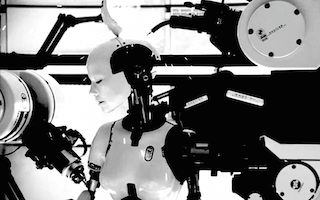 Björk in Chris Cunningham's All Is Full of Love, 1999
Björk in Chris Cunningham's All Is Full of Love, 1999
-
English 310: Science Fiction and the Futures of Medicine (fall 2016)
What can science fiction tell us about the social, ethical, and political dimensions of medicine? In this course, we’ll look at how a few medical categories have changed over recent history, and then we’ll explore how science-fictional “extrapolations” of present technologies help us to think about health and medicine in new ways. We’ll consider how fiction writers, filmmakers, historians, and scientists have imagined the consequences of possible developments such as increased longevity, pandemics, genetic modification, hormone treatments, and more. More >>>
 Hungarian-language book cover for Ramez Naam, Nexus, 2012, detail
Hungarian-language book cover for Ramez Naam, Nexus, 2012, detail
-
English 596K: Social Networks and Contemporary U.S. Literature (spring 2016)
This graduate course examines the connections between social network analysis, digital humanities methods, and contemporary literary studies with a focus on the U.S. context. We’ll start by looking at how scholars have recently begun to imagine how we periodize “contemporary” literature, with focuses on postmodernism, neoliberalism, knowledge work, and the network society. We’ll then ask how contemporary fiction and other literary forms model and map the social world, and to what ends, with attention to a variety of claims about the political ramifications of peer-to-peer networks and social media. More >>>
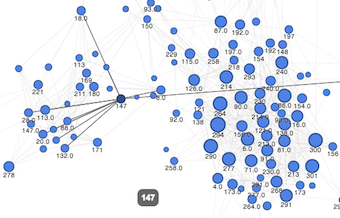 Social Network Visualization
Social Network Visualization
-
English 472: Modern Fiction (spring 2015)
This course in modernist fiction will explore one of the richest and most innovative periods in literary production. We’ll consider a number of contexts that shaped this set of literary movements, with a particular focus on new modes of perception. How did new ideas in psychology and psychoanalysis, growing cosmopolitan metropolises, and revolutions in communications media, we’ll ask, prompt modernists to experiment with new ways of seeing in fiction? We’ll see how novelists experimented with radical new ideas from Sigmund Freud and Henri Bergson, among others, and how other novelists carved out new territory for themselves as the cinema became a dominant force in popular culture. More >>>
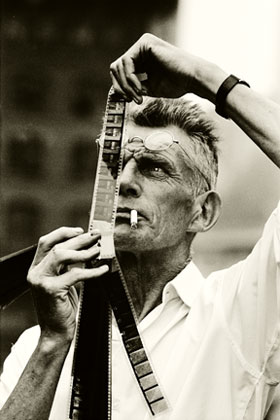 Samuel Becket, 1964
Samuel Becket, 1964
-
English 596K: Intro to Digital Humanities (fall 2014)
This graduate course is an introduction to digital humanities geared toward applications in literary and cultural studies. While students’ interests will help to shape our syllabus, particularly for sessions in the final weeks, we’ll be experimenting with: text mining and entity extraction, text encoding, social network analysis, web design frameworks, mapping and GIS, topic modeling, and creative visualization. No prior knowledge of computer programming is presumed; all students will learn some basic principles, and many of our lab activities will include options for students who wish to try out more advanced tools and methods. More >>>
 Social Network Visualization
Social Network Visualization
-
Past Courses
Networks in the Contemporary Novel (spring 2013, UCSB) Particularly since the rise of social media as part of our daily interactions, we think more and more about who we are through the form of the network. Our networks define the reach of our ideas, our access to information and modes of self-expression, and, increasingly, our understandings of power and agency. With regard to the latter, ideas about new networks have shaped the stories we tell about both new manifestations of democracy (Occupy, the 2009 elections in Iran, the Arab Spring) and new forms of control, surveillance, and suppression. More >>>